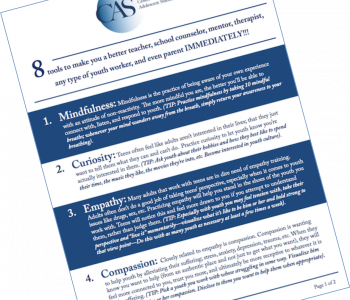

Catharine Hannay, MA
Catharine Hannay is the founder of MindfulTeachers.org and the author of Being You: A Girl’s Guide to Mindfulness, a workbook for teen girls on mindfulness, compassion, and self-acceptance.
Vicarious Trauma: How Youth Workers Can Support Each Other
Françoise Mathieu, an expert on compassion fatigue and secondary trauma, says that “Debriefing is an important part of the work that we do: it is a natural and important process in dealing with disturbing material.”
However, if this process isn’t handled well, it can contribute to the vicarious trauma experienced by your coworkers.
As Mathieu explains,
“If I am casually chatting with a colleague about their weekend plans and you barge in and tell us graphic details about the sexual abuse story you just heard, we will be more negatively impacted by the details. […]
If I know that you are coming to tell me a traumatic story, I will be more prepared to hear this information and it will be less traumatic for me to hear.”
You could say something like:
“I need to debrief something with you. Is this a good time?”
or
“I heard something really hard today. Could I talk to you about it?”
The other person may not be available just then, or they may be strongly affected by certain types of stories. You might need to find a different person to debrief with, or you might choose to share a limited amount of information.
If you’re the one who’s approached, you could indicate your level of consent by saying something like:
“I have 15 minutes, and I can hear some of your story, but would you be able to tell me what happened without any of the gory details?”
or
“If it’s about [something that’s a particular trigger for you], I’m probably the wrong person to talk to; but otherwise I’m fine to hear it.”
(adapted from The Compassion Fatigue Workbook, p. 44)
Conclusion
When you’ve just heard about a particularly troubling situation involving the youth under your care, sharing with a trusted colleague can help ease your own vicarious trauma.
Be sure to check with your coworkers first about how much they can handle hearing right now.
Also consider your own availability to listen to your colleagues when they’re in distress, and whether there are particular issues that are more or less triggering for you.
Fair warning, consent, and limited disclosure will ease your own burden without hurting your coworkers. The more you can support each other, the better you’ll be able to help the youth under your care.
Join the FREE Resilience Community for Helping Professionals to learn more about trauma-informed care, resilience, mindfulness, building relationships, and more! Our community features self-paced courses, a monthly live Zoom call, a weekly live meditation, and an online platform to connect with other providers/professionals in your field.
Related Posts
6 Ways to Support Overburdened Helpers
5 Types of Boundaries Every Youth Worker Needs

